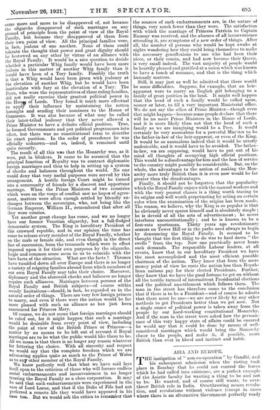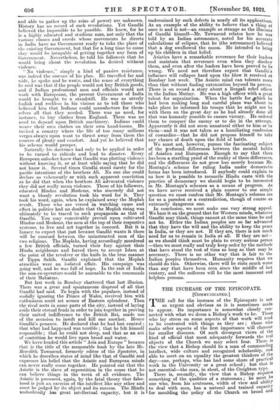ASIA AND EUROPE. T HE instigation of " non-co-operation" by Gandhi,
and his subsequent admission when the rioting took place in Bombay that he could not control the forces which he had called into existence, are a perfect example of the Asiatic faculty for wanting a thing to be and not to be. He wanted, and of course still wants, to over- throw British rule in India. Overthrowing means revolu- tion, and revolutions without violence (except in cases where there is an alternative Government perfectly ready and able to gather up the reins of power) are unknown. History has no record of such revolutions. Yet Gandhi believed the impossible to be possible. He knew, for he is a highly educated and studious man, not only that the various classes and creeds whose movements he directs in India have no Government ready to take the place of the existing Government, but that for a long time to come they would be incapable of getting together any form of Government. Nevertheless, he told his followers that he would bring about the revolution he desired without violence.
" No violence," simply a kind of passive resistance, was indeed the essence of his plan. He travelled far and wide, lie spoke and he wrote, and the sense of everything he said was that if the people would not buy British goods, and if Indian professional men and officials would not work with Europeans, the present Government of India would be brought to a standstill. He was so utterly foolish and reckless in his visions as to tell those who believed him that Indians could manufacture for them- selves all that they needed. There was no need, for instance, to buy clothes from England. There was no need to depend upon British machinery. Indians could weave their own clothes on their own hand-looms. He invited a country where the life of too many millions verges always upon want to thrust away from them the sources of plenty and comfort. And yet he believed that his scheme would prosper. Naturally his doctrines had only to be applied in order to be turned to ridicule and lead to disaster. Every European onlooker knew that Gandhi was plotting violence without knowing it, or at least while saying that he did not know it. Several times Gandhi stood surety for the pacific intentions of the brothers Ali. No one else could declare so vehemently or with such apparent conviction as he did that when the brothers Ali advocated violence they did not really mean violence. Those of his followers, educated Hindus and Moslems, who sincerely did not want a bloody revolution took his word for it. They took his word, again, when he explained away the Moplah revolt. Those who are versed in watching cause and effect in politics had no doubt that the Moplah rising was ultimately :to be traced to such propaganda as that of Gandhi. You may conceivably prevail upon cultivated Hindus and Moslems, the men at the top of their respective systems, to live and act together in concord. But it is lunacy to expect that just because Gandhi wants it there will be concord between the uninstructed men of the two religions. The Moplahs, having accordingly murdered a few British officials, turned their fury against their Hindu neighbours and forced them to accept Islam at the point of the revolver or the knife in the true manner of Tippu Sahib. Gandhi explained that the Moplah atrocities were an isolated affair. His campaign was going well, and he was full of hope. In the rest of India the non-co-operators would be amenable to the commands of their Mahatma.
But last week in Bombay shattered that last illusion. There was a great and spontaneous disproof of all that Gandhi had said. To begin with the populace, instead of stolidly ignoring the Prince of Wales, received him with enthusiasm amid set scenes of Eastern splendour. Then the rival sects in some parts of the city, instead of laying aside their eternal feuds in order to join together in proving their united indifference to the British Rat made use of the occasion to insult and kill one another. Hence Gandhi's penance. He declared that he had lost control ; that what had happened was terrible ; that he felt himself responsible ; that he could not sleep, and that as an act of contrition he would live upon bread and water. We have headed this article Asia and Europe " because that is the title of the memorable book by the late Mr. Meredith Townsend, formerly editor of the Spectator, in which he describes states of mind like that of Gandhi and expresses his belief that the Asiatic and European minds can never really come together. He pointed out that the Asiatic is the slave of superstition in the sense that he can believe things in the teeth of all evidence. The Asiatic is possessed, again, by the fatal theory that false- hood is just an exercise of the intellect like any other and must be judged by its object and its success. The Hindu undoubtedly bas great intellectual capacity, but it is undermined by such defects in nearly all its applications. As an example of the ability to believe that a thing at once is and is not—an example as strange as the illusions of Gandhi himself—Mr. Townsend relates how he was told by an Indian astronomer, noted for his accurate calculations of eclipses, that he (the astronomer) believed that a dog swallowed the moon. He intended to bring up his children in that belief. Asiatics have a remarkable reverence for their leaders and maintain that reverence even when they disobey them, and even after the leaders have been proved to be wrong. We need not therefore expect that Gandhi's influence will collapse hard upon the blow it received at Bombay last week. The Asiatic mind can tolerate more than that without finding extenuation beyond its powers. There is on record a story about a Bengali rebel officer in the Indian Mutiny. He was a high officer with a great talent for organization. When the battle for 4vhich he had been making long and careful plans was about to take place ho informed his troops that he might not be with them on the great day as he had already done all that was humanly possible to ensure victory. He ordered them to conquer the enemy or to die in the attempt. Apparently it did not seem unnatural either to him or to them—and it was not taken as a humiliating confession of cowardice—that he did not propose himself to take any chance of death upon the field of battle. We must not, however, pursue the fascinating subject of the profound differences between the mental habits of Asiatics and Europeans. Enough to say that there has been a startling proof of the reality of these differences, and the differences do not grow less merely because Mr. Montage's scheme for ruling India under democratic forms has been introduced. If anybody could explain to us how it is possible to reconcile Hindu caste with the practice of democracy we should begin to be interested in Mr. Montage's schemes as a means of progress. As we have never received a plain answer to our simple question we must confess that Mr. Montage's reforms are for us a paradox or a contradiction, though of course an extremely dangerous one. In conclusion, we must make one very strong appeal. We base it on the ground that for Western minds, whatever Gandhi may think, things cannot at the same time be and not be. Either the Indian peoples are so far advanced that they have the will and the ability to keep the peace in India, or they are not. If they are, there is not much need for us to remain in India at all. If they are not- es we should think must be plain to every serious person —then we must really and truly keep order by the methods that have stood the test of time so long as that may be necessary. There is no other way that is fair to the Indian peoples themselves. Humanity requires that we should do this. Otherwise, there will be riots much worse than any that have been seen since the middle of last century, and the sufferers will be the most innocent and helpless persons.











































 Previous page
Previous page